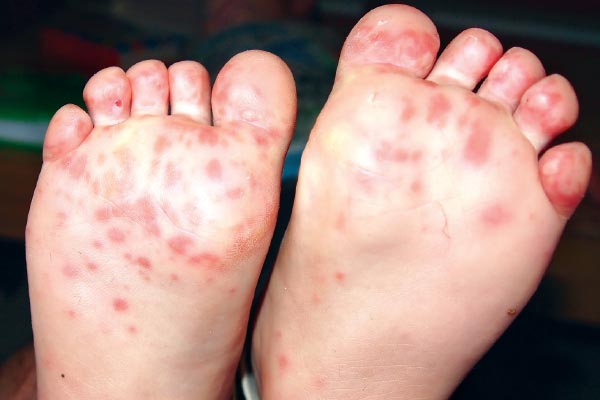Dr Jinan Harith Darwish is a paediatric allergy specialist and clinical immunology fellow at the King Faisal Specialist Hospital & Research Center. Each month she answers your parenting questions.
Q: I’ve read and heard about an outbreak of foot and mouth disease among nursery kids. My daughter goes to nursery and I’m really worried. Surely this isn’t the same thing that kills animals? Is there a vaccination I can get for her?
AHand, foot and mouth disease (HFMD) can be confused with hoof-and-mouth disease, which affects cattle, sheep and swine. Humans do not get the animal disease, and animals do not get the human disease.
HFMD is common in children and is typically caused by enteroviruses such as Coxsackie virus and EV71.The classic symptoms are a fever, sore throat and a rash, which looks like small red spots or even a bit of a blister, occurring on a child’s palms, soles and frequently in their throats, causing pain. Many children have a rash on their buttocks and legs as well. This can often be mistaken for a diaper rash if there are no other associated symptoms. Sometimes children present with painful ulcers at the back of the mouth, without a rash on the hands or feet. The disease is most contagious before the rash appears, so it can be tricky to avoid catching it. Treatment is comfort measures with pain relief and hydration. Currently, there isn’t an approved vaccine.
To avert HFMD, members of the public and, above all, the management of institutions, should take heed of the following preventive measures:
l Maintain good air circulation.
l Wash hands before meals and after going to the toilet or handling diapers or other stool-soiled materials.
l Keep hands clean and wash hands properly.
l Children who are ill should be kept out of school until their fever and rash have subsided and all the vesicles have dried and crusted.
Q: This is a difficult question but I’m hoping you can give me some advice. My three-year-old has developed a fear of going to the toilet and I don’t know what to do. He was potty-trained early and has been clean and dry for a long time but, over the last month or so, he does not want to go and is getting very constipated. My husband says to just let him be, that it will sort itself out with time, but I’m concerned that he could be doing himself some damage.
A Faecal incontinence is a common childhood condition that causes noteworthy disruption and impairment to children and families. Recent reviews have found that the treatment literature remains disjointed and difficult to interpret.
Potty or toilet? Your son will sooner or later adapt to whichever you decide but, to make it as comfortable as possible, you may want to choose specifically according to your child. For younger or smaller children, or for the independent child that will enjoy having something entirely his, a potty may be the best option because it is, for the most part, comfortable. He is not only less likely to fall but it helps him to push properly by allowing him to plant his feet on the ground. A potty also allows for a sense of pride and ownership because your child can help pick it out, decorate it and surround it with his much-loved toys so he can play when it’s potty time. Musical potties can give your son an instant reward but can drive you up the wall if you can’t stand repetitive noise.
An attachable toilet seat may be a superior idea for your larger or older child interested more in imitating an older brother or parent. It may simplify matters by skipping the step of getting used to the potty and going straight to the toilet, but children are often more frightened of adult toilets than of their own potties. So choose this option only if you are sure that your child isn’t afraid of the toilet or its flush. Make sure the attachable toilet seat fits well and is stable so that your son doesn’t feel that he is going to fall. Make sure that there is a stool for your child so he is able to get onto the toilet and also plant his feet firmly while he pushes. Be careful not to flush the toilet while your child is still sitting on it. This often is very frightening for the child and can make him very afraid of the toilet. I hope this helps. Good luck and I would love to hear your feedback.
If you have a question for Dr Jinan, please email [email protected]





































